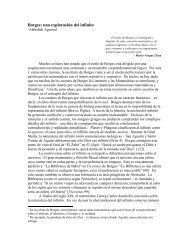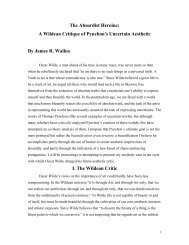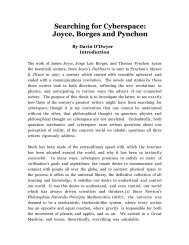And A Very Good Time It Was: A Short Life of ... - The Modern Word
And A Very Good Time It Was: A Short Life of ... - The Modern Word
And A Very Good Time It Was: A Short Life of ... - The Modern Word
Create successful ePaper yourself
Turn your PDF publications into a flip-book with our unique Google optimized e-Paper software.
and gave her copies <strong>of</strong> Chamber Music and Portrait. When she refused his sexual advances, he<br />
thought what worked with Nora might work with her, and gave her a letter describing his first<br />
sexual arousal as a boy. When walking home with a nurse who told him to turn around while she<br />
urinated in a field, Joyce became aroused at the sound; but as Kampffer was not familiar with the<br />
terms “piss” and “jiggled” (used to describe his excitement), his confession was left<br />
misunderstood and unwanted.<br />
Now, in late 1918, Joyce met Marthe Fleischmann, and was astonished at how much she<br />
resembled the girl he had seen in the Strand in 1898. He began to watch her, and at first she tried<br />
to ignore him. He finally wrote her a note in French, and as each was already involved with<br />
another, their correspondence was kept secret. She became important in Ulysses, as her limp was<br />
given to Gerty MacDowell, and her name to the girl Bloom writes to, Marthe Clifford. On<br />
Joyce’s birthday, 1919, she agreed to meet him in the afternoon, and Joyce planned for her arrival<br />
in the manner <strong>of</strong> a romantic farce. He purchased a ceremonial candlestick lighted during<br />
Chanukah, and then recruited Budgen. When his friend was leery <strong>of</strong> helping with Joyce’s<br />
infidelity, Joyce said, “If I permitted myself any restraint in this matter it would be spiritual death<br />
to me.” 142 <strong>The</strong>y set up the candle in Budgen’s studio and hung his paintings on the walls. When<br />
Joyce suggested that the only thing missing was a nude “with ample buttocks,” Budgen quickly<br />
drew one up, and in an uncharacteristic move, Joyce allowed that when Marthe came over they<br />
were to address each other as “Jim” and “Frank” (Joyce rarely allowed anyone to call him by his<br />
first name). She arrived, and after walking around the studio (looking embarrassed at the nude as<br />
Joyce hoped she would), he accompanied her home. He told Budgen later, “I have explored the<br />
coldest and hottest parts <strong>of</strong> a woman’s body,” but Ellmann suggests that sexual intercourse did<br />
not take place, instead that she had been “fingered only.” 143<br />
Since at no point, it seems, did Joyce ever think <strong>of</strong> leaving Nora for one <strong>of</strong> these late<br />
infatuations, the reason now given for them is the boring and merely creative one: he was writing<br />
a book about a married couple, both unfaithful, but who always prefer one another at the end <strong>of</strong><br />
the day. A few times Joyce encouraged Nora to go with other men, but she never would, and in<br />
these ploys we can see how totally Ulysses held Joyce. Brenda Maddox says: “<strong>It</strong> was more than a<br />
book; it was a whole private world into which Joyce had withdrawn, taking his libido with<br />
him.” 144 Indeed, the book consumed Joyce in every way, so that when working on the Oxen <strong>of</strong> the<br />
Sun episode, “his head was so full <strong>of</strong> images <strong>of</strong> half-born fetuses, swabs, and the smell <strong>of</strong><br />
disinfectant that he could not eat.” 145<br />
In the fall <strong>of</strong> 1918 Joyce had won the first case with Carr, for which he wrote a humorous and<br />
bawdy broadside. Around his birthday a few months later he (finally) gave up the libel suit, and<br />
as a result was ordered to pay 59 francs in court costs and 120 francs in damages, which he<br />
promptly avoided doing. He was notified in April that if he did not pay the court would take<br />
action against him and, again a martyr in his own mind, “made his plight known to the world,” 146<br />
writing letters to his agent, the British Foreign Office, friends in Dublin, and to Huebsch and<br />
Padraic Colum (both in New York), exaggerating his troubles by saying 10,000 francs were at<br />
stake.<br />
Meanwhile, he brushed up on his Hamlet and read other books to write the Scylla and<br />
Charybdis chapter in Ulysses, and then added the Wandering Rocks episode. Now having reached<br />
Cyclops, he was beginning to get his first hint <strong>of</strong> negative responses from Pound and Weaver.<br />
Pound also said that “a new style per chapter not required,” 147 a strange thing to say halfway<br />
through the book’s composition. As Joyce would do ten years later at the opposition to Finnegans<br />
Wake, he wrote defending letters to both, assuring them that the various styles used were “not<br />
capricious.” 148





